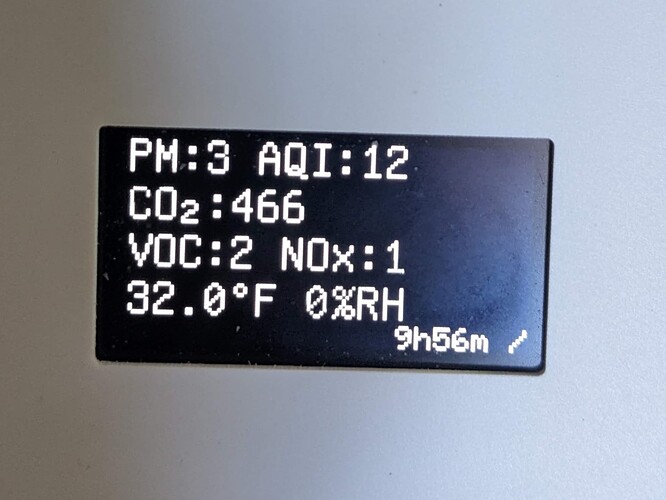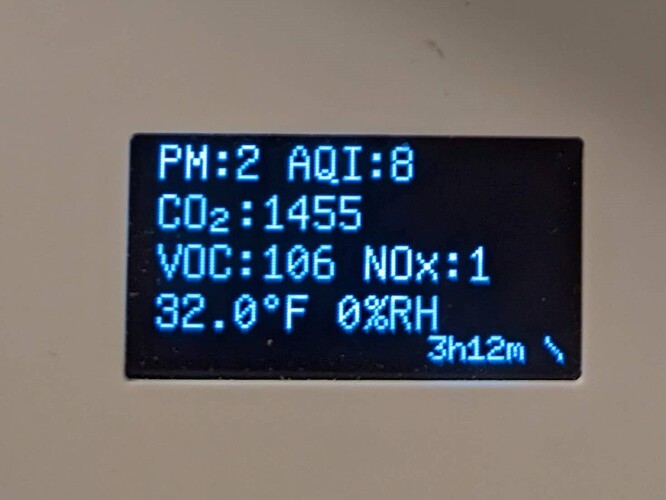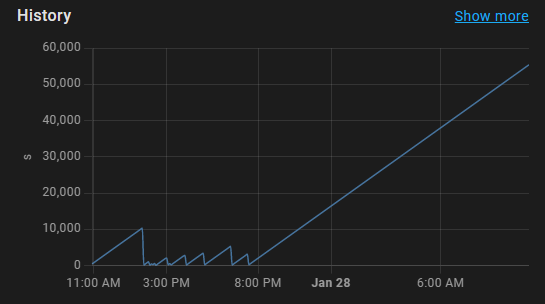Okay… Thanks to some posts on the issues and PR sections of the esp8266 Arduino core github page a few days ago , I was able to workaround the bug preventing me from compiling with core v3.1.0 and above by manually replacing the bad mkbuildoptglobals.py file. This allowed me to compile the sketch with the newer Core versions in the older Arduino IDE v1.8.x , which finally allowed me to run the ESP Exception Decoder. And the results look much better:
It crashes so often, I have decoded dozens of exceptions and each one is always the same:
circular_queue ::available() const at c:\users\ken\appdata\local\arduino15\packages\esp8266\tools\xtensa-lx106-elf-gcc\3.1.0-gcc10.3-e5f9fec\xtensa-lx106-elf\include\c++\10.3.0\bits/atomic_base.h line 420
atomic_base.h is an “internal header file” and line 420 looks like this:
25 /** @file bits/atomic_base.h
26 * This is an internal header file, included by other library headers.
27 * Do not attempt to use it directly. @headername{atomic}
28 */
.
.
.
419 _GLIBCXX_ALWAYS_INLINE __int_type
420 load(memory_order __m = memory_order_seq_cst) const noexcept
421 {
422 memory_order __b = __m & __memory_order_mask;
423 __glibcxx_assert(__b != memory_order_release);
424 __glibcxx_assert(__b != memory_order_acq_rel);
Here are some decoded exceptions:
Exception 0: Illegal instruction
PC: 0x40219d04: circular_queue ::available() const at c:\users\ken\appdata\local\arduino15\packages\esp8266\tools\xtensa-lx106-elf-gcc\3.1.0-gcc10.3-e5f9fec\xtensa-lx106-elf\include\c++\10.3.0\bits/atomic_base.h line 420
EXCVADDR: 0x00000000
Decoding stack results
0x40100648: ets_post(uint8, ETSSignal, ETSParam) at C:\Users\Ken\AppData\Local\Arduino15\packages\esp8266\hardware\esp8266\3.1.1\cores\esp8266\core_esp8266_main.cpp line 238
0x40100c04: interrupt_handler(void*, void*) at C:\Users\Ken\AppData\Local\Arduino15\packages\esp8266\hardware\esp8266\3.1.1\cores\esp8266\core_esp8266_wiring_digital.cpp line 167
0x40100b40: interrupt_handler(void*, void*) at C:\Users\Ken\AppData\Local\Arduino15\packages\esp8266\hardware\esp8266\3.1.1\cores\esp8266\core_esp8266_wiring_digital.cpp line 138
0x40100c04: interrupt_handler(void*, void*) at C:\Users\Ken\AppData\Local\Arduino15\packages\esp8266\hardware\esp8266\3.1.1\cores\esp8266\core_esp8266_wiring_digital.cpp line 167
0x40100b40: interrupt_handler(void*, void*) at C:\Users\Ken\AppData\Local\Arduino15\packages\esp8266\hardware\esp8266\3.1.1\cores\esp8266\core_esp8266_wiring_digital.cpp line 138
0x4010062b: ets_intr_unlock() at C:\Users\Ken\AppData\Local\Arduino15\packages\esp8266\hardware\esp8266\3.1.1\cores\esp8266\core_esp8266_main.cpp line 226
0x40228c85: sys_timeout_abs at core/timeouts.c line 189
0x401000ab: app_entry_redefinable() at C:\Users\Ken\AppData\Local\Arduino15\packages\esp8266\hardware\esp8266\3.1.1\cores\esp8266\core_esp8266_main.cpp line 386
0x40100648: ets_post(uint8, ETSSignal, ETSParam) at C:\Users\Ken\AppData\Local\Arduino15\packages\esp8266\hardware\esp8266\3.1.1\cores\esp8266\core_esp8266_main.cpp line 238
0x40100648: ets_post(uint8, ETSSignal, ETSParam) at C:\Users\Ken\AppData\Local\Arduino15\packages\esp8266\hardware\esp8266\3.1.1\cores\esp8266\core_esp8266_main.cpp line 238
0x40223559: glue2esp_linkoutput at glue-esp/lwip-esp.c line 301
0x40223787: new_linkoutput at glue-lwip/lwip-git.c line 272
0x40100648: ets_post(uint8, ETSSignal, ETSParam) at C:\Users\Ken\AppData\Local\Arduino15\packages\esp8266\hardware\esp8266\3.1.1\cores\esp8266\core_esp8266_main.cpp line 238
0x4022cb94: ip4_output_if_opt_src at core/ipv4/ip4.c line 1764
0x40223559: glue2esp_linkoutput at glue-esp/lwip-esp.c line 301
0x40223787: new_linkoutput at glue-lwip/lwip-git.c line 272
0x40223be2: ethernet_output at netif/ethernet.c line 312
0x4010107e: umm_free_core(umm_heap_context_t*, void*) at C:\Users\Ken\AppData\Local\Arduino15\packages\esp8266\hardware\esp8266\3.1.1\cores\esp8266\umm_malloc\umm_malloc.cpp line 642
0x40100c04: interrupt_handler(void*, void*) at C:\Users\Ken\AppData\Local\Arduino15\packages\esp8266\hardware\esp8266\3.1.1\cores\esp8266\core_esp8266_wiring_digital.cpp line 167
0x40100648: ets_post(uint8, ETSSignal, ETSParam) at C:\Users\Ken\AppData\Local\Arduino15\packages\esp8266\hardware\esp8266\3.1.1\cores\esp8266\core_esp8266_main.cpp line 238
0x40100b40: interrupt_handler(void*, void*) at C:\Users\Ken\AppData\Local\Arduino15\packages\esp8266\hardware\esp8266\3.1.1\cores\esp8266\core_esp8266_wiring_digital.cpp line 138
0x402176d3: Twi::WAIT_CLOCK_STRETCH() at C:\Users\Ken\AppData\Local\Arduino15\packages\esp8266\hardware\esp8266\3.1.1\cores\esp8266/PolledTimeout.h line 130
0x40217974: Twi::read_bit() at C:\Users\Ken\AppData\Local\Arduino15\packages\esp8266\hardware\esp8266\3.1.1\cores\esp8266\core_esp8266_si2c.cpp line 336
0x40217b48: Twi::writeTo(unsigned char, unsigned char*, unsigned int, unsigned char) at C:\Users\Ken\AppData\Local\Arduino15\packages\esp8266\hardware\esp8266\3.1.1\cores\esp8266\core_esp8266_si2c.cpp line 368
0x4021347c: HardwareSerial::write(unsigned char const*, unsigned int) at C:\Users\Ken\AppData\Local\Arduino15\packages\esp8266\hardware\esp8266\3.1.1\cores\esp8266/HardwareSerial.h line 193
0x40217b48: Twi::writeTo(unsigned char, unsigned char*, unsigned int, unsigned char) at C:\Users\Ken\AppData\Local\Arduino15\packages\esp8266\hardware\esp8266\3.1.1\cores\esp8266\core_esp8266_si2c.cpp line 368
0x4021347c: HardwareSerial::write(unsigned char const*, unsigned int) at C:\Users\Ken\AppData\Local\Arduino15\packages\esp8266\hardware\esp8266\3.1.1\cores\esp8266/HardwareSerial.h line 193
0x40212c64: u8x8_byte_arduino_hw_i2c(u8x8_t*, uint8_t, uint8_t, void*) at C:\Users\Ken\Documents\Arduino\libraries\U8g2\src\U8x8lib.cpp line 1316
0x40202606: u8x8_cad_ssd13xx_fast_i2c at C:\Users\Ken\Documents\Arduino\libraries\U8g2\src\clib\u8x8_cad.c line 582
0x40212c48: u8x8_byte_arduino_hw_i2c(u8x8_t*, uint8_t, uint8_t, void*) at C:\Users\Ken\Documents\Arduino\libraries\U8g2\src\U8x8lib.cpp line 1316
0x402035dc: u8x8_byte_EndTransfer at C:\Users\Ken\Documents\Arduino\libraries\U8g2\src\clib\u8x8_byte.c line 61
0x4021347c: HardwareSerial::write(unsigned char const*, unsigned int) at C:\Users\Ken\AppData\Local\Arduino15\packages\esp8266\hardware\esp8266\3.1.1\cores\esp8266/HardwareSerial.h line 193
0x40100c04: interrupt_handler(void*, void*) at C:\Users\Ken\AppData\Local\Arduino15\packages\esp8266\hardware\esp8266\3.1.1\cores\esp8266\core_esp8266_wiring_digital.cpp line 167
0x40100c04: interrupt_handler(void*, void*) at C:\Users\Ken\AppData\Local\Arduino15\packages\esp8266\hardware\esp8266\3.1.1\cores\esp8266\core_esp8266_wiring_digital.cpp line 167
0x40100b40: interrupt_handler(void*, void*) at C:\Users\Ken\AppData\Local\Arduino15\packages\esp8266\hardware\esp8266\3.1.1\cores\esp8266\core_esp8266_wiring_digital.cpp line 138
0x40100a4c: micros() at C:\Users\Ken\AppData\Local\Arduino15\packages\esp8266\hardware\esp8266\3.1.1\cores\esp8266\core_esp8266_wiring.cpp line 181
0x40100110: SoftwareSerial::preciseDelay() at C:\Users\Ken\AppData\Local\Arduino15\packages\esp8266\hardware\esp8266\3.1.1\libraries\SoftwareSerial\src/SoftwareSerial.h line 246
0x4021790d: Twi::write_bit(bool) at C:\Users\Ken\AppData\Local\Arduino15\packages\esp8266\hardware\esp8266\3.1.1\cores\esp8266\core_esp8266_si2c.cpp line 325
0x4021787d: Twi::write_stop() at C:\Users\Ken\AppData\Local\Arduino15\packages\esp8266\hardware\esp8266\3.1.1\cores\esp8266\core_esp8266_si2c.cpp line 304
0x40217b01: Twi::readFrom(unsigned char, unsigned char*, unsigned int, unsigned char) at C:\Users\Ken\AppData\Local\Arduino15\packages\esp8266\hardware\esp8266\3.1.1\cores\esp8266\core_esp8266_si2c.cpp line 433
0x4021278c: TwoWire::requestFrom(unsigned char, unsigned int, bool) at C:\Users\Ken\AppData\Local\Arduino15\packages\esp8266\hardware\esp8266\3.1.1\libraries\Wire\Wire.cpp line 129
0x402127c0: TwoWire::requestFrom(unsigned char, unsigned char, unsigned char) at C:\Users\Ken\AppData\Local\Arduino15\packages\esp8266\hardware\esp8266\3.1.1\libraries\Wire\Wire.cpp line 137
0x40212966: SensirionI2CCommunication::receiveFrame(unsigned char, unsigned int, SensirionI2CRxFrame&, TwoWire&, CrcPolynomial) at C:\Users\Ken\Documents\Arduino\libraries\Sensirion_Core\src\SensirionI2CCommunication.cpp line 101
0x40216c68: __esp_suspend() at C:\Users\Ken\AppData\Local\Arduino15\packages\esp8266\hardware\esp8266\3.1.1\cores\esp8266/core_esp8266_features.h line 64
0x40216db9: __esp_delay(unsigned long) at C:\Users\Ken\AppData\Local\Arduino15\packages\esp8266\hardware\esp8266\3.1.1\cores\esp8266\core_esp8266_main.cpp line 161
0x40216e2e: esp_try_delay(unsigned int, unsigned int, unsigned int) at C:\Users\Ken\AppData\Local\Arduino15\packages\esp8266\hardware\esp8266\3.1.1\cores\esp8266\core_esp8266_main.cpp line 182
0x40217d90: __delay(unsigned long) at C:\Users\Ken\AppData\Local\Arduino15\packages\esp8266\hardware\esp8266\3.1.1\cores\esp8266/coredecls.h line 69
0x402037a7: updateTVOC() at C:\Users\Ken\Documents\Arduino\sketch_jan24a/sketch_jan24a.ino line 184
0x40204a84: loop() at C:\Users\Ken\Documents\Arduino\sketch_jan24a/sketch_jan24a.ino line 149
Exception 0: Illegal instruction
PC: 0x40219d04: circular_queue ::available() const at c:\users\ken\appdata\local\arduino15\packages\esp8266\tools\xtensa-lx106-elf-gcc\3.1.0-gcc10.3-e5f9fec\xtensa-lx106-elf\include\c++\10.3.0\bits/atomic_base.h line 420
EXCVADDR: 0x00000000
Decoding stack results
0x40100c04: interrupt_handler(void*, void*) at C:\Users\Ken\AppData\Local\Arduino15\packages\esp8266\hardware\esp8266\3.1.1\cores\esp8266\core_esp8266_wiring_digital.cpp line 167
0x40100b40: interrupt_handler(void*, void*) at C:\Users\Ken\AppData\Local\Arduino15\packages\esp8266\hardware\esp8266\3.1.1\cores\esp8266\core_esp8266_wiring_digital.cpp line 138
0x40100c04: interrupt_handler(void*, void*) at C:\Users\Ken\AppData\Local\Arduino15\packages\esp8266\hardware\esp8266\3.1.1\cores\esp8266\core_esp8266_wiring_digital.cpp line 167
0x40100648: ets_post(uint8, ETSSignal, ETSParam) at C:\Users\Ken\AppData\Local\Arduino15\packages\esp8266\hardware\esp8266\3.1.1\cores\esp8266\core_esp8266_main.cpp line 238
0x40100b40: interrupt_handler(void*, void*) at C:\Users\Ken\AppData\Local\Arduino15\packages\esp8266\hardware\esp8266\3.1.1\cores\esp8266\core_esp8266_wiring_digital.cpp line 138
0x40228c85: sys_timeout_abs at core/timeouts.c line 189
0x401000ab: app_entry_redefinable() at C:\Users\Ken\AppData\Local\Arduino15\packages\esp8266\hardware\esp8266\3.1.1\cores\esp8266\core_esp8266_main.cpp line 386
0x40100648: ets_post(uint8, ETSSignal, ETSParam) at C:\Users\Ken\AppData\Local\Arduino15\packages\esp8266\hardware\esp8266\3.1.1\cores\esp8266\core_esp8266_main.cpp line 238
0x40216e54: esp_yield() at C:\Users\Ken\AppData\Local\Arduino15\packages\esp8266\hardware\esp8266\3.1.1\cores\esp8266\core_esp8266_main.cpp line 144
0x40218864: uart_write(uart_t*, char const*, size_t) at C:\Users\Ken\AppData\Local\Arduino15\packages\esp8266\hardware\esp8266\3.1.1\cores\esp8266\uart.cpp line 547
0x40218864: uart_write(uart_t*, char const*, size_t) at C:\Users\Ken\AppData\Local\Arduino15\packages\esp8266\hardware\esp8266\3.1.1\cores\esp8266\uart.cpp line 547
0x40214744: Print::print(__FlashStringHelper const*) at C:\Users\Ken\AppData\Local\Arduino15\packages\esp8266\hardware\esp8266\3.1.1\cores\esp8266\Print.cpp line 106
0x4021347c: HardwareSerial::write(unsigned char const*, unsigned int) at C:\Users\Ken\AppData\Local\Arduino15\packages\esp8266\hardware\esp8266\3.1.1\cores\esp8266/HardwareSerial.h line 193
0x40214854: Print::printNumber (unsigned long, unsigned char) at C:\Users\Ken\AppData\Local\Arduino15\packages\esp8266\hardware\esp8266\3.1.1\cores\esp8266\Print.cpp line 262
0x4021e804: utoa at /workdir/repo/newlib/newlib/libc/stdlib/utoa.c line 74
0x4021347c: HardwareSerial::write(unsigned char const*, unsigned int) at C:\Users\Ken\AppData\Local\Arduino15\packages\esp8266\hardware\esp8266\3.1.1\cores\esp8266/HardwareSerial.h line 193
0x40101400: malloc(size_t) at C:\Users\Ken\AppData\Local\Arduino15\packages\esp8266\hardware\esp8266\3.1.1\cores\esp8266\umm_malloc\umm_malloc.cpp line 912
0x40213661: IPAddress::printTo(Print&) const at C:\Users\Ken\AppData\Local\Arduino15\packages\esp8266\hardware\esp8266\3.1.1\cores\esp8266/IPAddress.h line 165
0x4010107e: umm_free_core(umm_heap_context_t*, void*) at C:\Users\Ken\AppData\Local\Arduino15\packages\esp8266\hardware\esp8266\3.1.1\cores\esp8266\umm_malloc\umm_malloc.cpp line 642
0x4021347c: HardwareSerial::write(unsigned char const*, unsigned int) at C:\Users\Ken\AppData\Local\Arduino15\packages\esp8266\hardware\esp8266\3.1.1\cores\esp8266/HardwareSerial.h line 193
0x40208a35: WiFiManager::DEBUG_WM__FlashStringHelper const*, IPAddress>(WiFiManager::wm_debuglevel_t, __FlashStringHelper const*, IPAddress) at C:\Users\Ken\AppData\Local\Arduino15\packages\esp8266\hardware\esp8266\3.1.1\cores\esp8266/IPAddress.h line 88
0x4021347c: HardwareSerial::write(unsigned char const*, unsigned int) at C:\Users\Ken\AppData\Local\Arduino15\packages\esp8266\hardware\esp8266\3.1.1\cores\esp8266/HardwareSerial.h line 193
0x402157a1: String::copy(char const*, unsigned int) at C:\Users\Ken\AppData\Local\Arduino15\packages\esp8266\hardware\esp8266\3.1.1\cores\esp8266\WString.cpp line 258
0x40215971: String::operator=(char const*) at C:\Users\Ken\AppData\Local\Arduino15\packages\esp8266\hardware\esp8266\3.1.1\cores\esp8266\WString.cpp line 303
0x40218864: uart_write(uart_t*, char const*, size_t) at C:\Users\Ken\AppData\Local\Arduino15\packages\esp8266\hardware\esp8266\3.1.1\cores\esp8266\uart.cpp line 547
0x402159f2: String::String(unsigned long, unsigned char) at C:\Users\Ken\AppData\Local\Arduino15\packages\esp8266\hardware\esp8266\3.1.1\cores\esp8266\WString.cpp line 82
0x4021347c: HardwareSerial::write(unsigned char const*, unsigned int) at C:\Users\Ken\AppData\Local\Arduino15\packages\esp8266\hardware\esp8266\3.1.1\cores\esp8266/HardwareSerial.h line 193
0x40208a86: WiFiManager::DEBUG_WM__FlashStringHelper const*, IPAddress>(__FlashStringHelper const*, IPAddress) at C:\Users\Ken\Documents\Arduino\libraries\WiFiManager\WiFiManager.cpp line 3281
0x402064d4: String::operator!=(char const*) const at C:\Users\Ken\AppData\Local\Arduino15\packages\esp8266\hardware\esp8266\3.1.1\cores\esp8266/WString.h line 234
0x4010107e: umm_free_core(umm_heap_context_t*, void*) at C:\Users\Ken\AppData\Local\Arduino15\packages\esp8266\hardware\esp8266\3.1.1\cores\esp8266\umm_malloc\umm_malloc.cpp line 642
0x4010107e: umm_free_core(umm_heap_context_t*, void*) at C:\Users\Ken\AppData\Local\Arduino15\packages\esp8266\hardware\esp8266\3.1.1\cores\esp8266\umm_malloc\umm_malloc.cpp line 642
0x40100c04: interrupt_handler(void*, void*) at C:\Users\Ken\AppData\Local\Arduino15\packages\esp8266\hardware\esp8266\3.1.1\cores\esp8266\core_esp8266_wiring_digital.cpp line 167
0x40100648: ets_post(uint8, ETSSignal, ETSParam) at C:\Users\Ken\AppData\Local\Arduino15\packages\esp8266\hardware\esp8266\3.1.1\cores\esp8266\core_esp8266_main.cpp line 238
0x40100c04: interrupt_handler(void*, void*) at C:\Users\Ken\AppData\Local\Arduino15\packages\esp8266\hardware\esp8266\3.1.1\cores\esp8266\core_esp8266_wiring_digital.cpp line 167
0x40100c04: interrupt_handler(void*, void*) at C:\Users\Ken\AppData\Local\Arduino15\packages\esp8266\hardware\esp8266\3.1.1\cores\esp8266\core_esp8266_wiring_digital.cpp line 167
0x40100b40: interrupt_handler(void*, void*) at C:\Users\Ken\AppData\Local\Arduino15\packages\esp8266\hardware\esp8266\3.1.1\cores\esp8266\core_esp8266_wiring_digital.cpp line 138
0x402178c8: Twi::write_bit(bool) at C:\Users\Ken\AppData\Local\Arduino15\packages\esp8266\hardware\esp8266\3.1.1\cores\esp8266\core_esp8266_si2c.cpp line 313
0x402179cb: Twi::write_byte(unsigned char) at C:\Users\Ken\AppData\Local\Arduino15\packages\esp8266\hardware\esp8266\3.1.1\cores\esp8266\core_esp8266_si2c.cpp line 347
0x40217b48: Twi::writeTo(unsigned char, unsigned char*, unsigned int, unsigned char) at C:\Users\Ken\AppData\Local\Arduino15\packages\esp8266\hardware\esp8266\3.1.1\cores\esp8266\core_esp8266_si2c.cpp line 368
0x4021347c: HardwareSerial::write(unsigned char const*, unsigned int) at C:\Users\Ken\AppData\Local\Arduino15\packages\esp8266\hardware\esp8266\3.1.1\cores\esp8266/HardwareSerial.h line 193
0x40100648: ets_post(uint8, ETSSignal, ETSParam) at C:\Users\Ken\AppData\Local\Arduino15\packages\esp8266\hardware\esp8266\3.1.1\cores\esp8266\core_esp8266_main.cpp line 238
0x402127ec: TwoWire::beginTransmission(unsigned char) at C:\Users\Ken\AppData\Local\Arduino15\packages\esp8266\hardware\esp8266\3.1.1\libraries\Wire\Wire.cpp line 158
0x4021347c: HardwareSerial::write(unsigned char const*, unsigned int) at C:\Users\Ken\AppData\Local\Arduino15\packages\esp8266\hardware\esp8266\3.1.1\cores\esp8266/HardwareSerial.h line 193
0x40100c04: interrupt_handler(void*, void*) at C:\Users\Ken\AppData\Local\Arduino15\packages\esp8266\hardware\esp8266\3.1.1\cores\esp8266\core_esp8266_wiring_digital.cpp line 167
0x40100c04: interrupt_handler(void*, void*) at C:\Users\Ken\AppData\Local\Arduino15\packages\esp8266\hardware\esp8266\3.1.1\cores\esp8266\core_esp8266_wiring_digital.cpp line 167
0x40100b40: interrupt_handler(void*, void*) at C:\Users\Ken\AppData\Local\Arduino15\packages\esp8266\hardware\esp8266\3.1.1\cores\esp8266\core_esp8266_wiring_digital.cpp line 138
0x40100110: SoftwareSerial::preciseDelay() at C:\Users\Ken\AppData\Local\Arduino15\packages\esp8266\hardware\esp8266\3.1.1\libraries\SoftwareSerial\src/SoftwareSerial.h line 246
0x4021790d: Twi::write_bit(bool) at C:\Users\Ken\AppData\Local\Arduino15\packages\esp8266\hardware\esp8266\3.1.1\cores\esp8266\core_esp8266_si2c.cpp line 325
0x4021787d: Twi::write_stop() at C:\Users\Ken\AppData\Local\Arduino15\packages\esp8266\hardware\esp8266\3.1.1\cores\esp8266\core_esp8266_si2c.cpp line 304
0x40217b01: Twi::readFrom(unsigned char, unsigned char*, unsigned int, unsigned char) at C:\Users\Ken\AppData\Local\Arduino15\packages\esp8266\hardware\esp8266\3.1.1\cores\esp8266\core_esp8266_si2c.cpp line 433
0x4021278c: TwoWire::requestFrom(unsigned char, unsigned int, bool) at C:\Users\Ken\AppData\Local\Arduino15\packages\esp8266\hardware\esp8266\3.1.1\libraries\Wire\Wire.cpp line 129
0x402127c0: TwoWire::requestFrom(unsigned char, unsigned char, unsigned char) at C:\Users\Ken\AppData\Local\Arduino15\packages\esp8266\hardware\esp8266\3.1.1\libraries\Wire\Wire.cpp line 137
0x40212966: SensirionI2CCommunication::receiveFrame(unsigned char, unsigned int, SensirionI2CRxFrame&, TwoWire&, CrcPolynomial) at C:\Users\Ken\Documents\Arduino\libraries\Sensirion_Core\src\SensirionI2CCommunication.cpp line 101
0x40216c68: __esp_suspend() at C:\Users\Ken\AppData\Local\Arduino15\packages\esp8266\hardware\esp8266\3.1.1\cores\esp8266/core_esp8266_features.h line 64
0x40216db9: __esp_delay(unsigned long) at C:\Users\Ken\AppData\Local\Arduino15\packages\esp8266\hardware\esp8266\3.1.1\cores\esp8266\core_esp8266_main.cpp line 161
0x40216e2e: esp_try_delay(unsigned int, unsigned int, unsigned int) at C:\Users\Ken\AppData\Local\Arduino15\packages\esp8266\hardware\esp8266\3.1.1\cores\esp8266\core_esp8266_main.cpp line 182
0x40217d90: __delay(unsigned long) at C:\Users\Ken\AppData\Local\Arduino15\packages\esp8266\hardware\esp8266\3.1.1\cores\esp8266/coredecls.h line 69
0x402037a7: updateTVOC() at C:\Users\Ken\Documents\Arduino\sketch_jan24a/sketch_jan24a.ino line 184
0x40204a84: loop() at C:\Users\Ken\Documents\Arduino\sketch_jan24a/sketch_jan24a.ino line 149
Exception 0: Illegal instruction
PC: 0x40219d04: circular_queue ::available() const at c:\users\ken\appdata\local\arduino15\packages\esp8266\tools\xtensa-lx106-elf-gcc\3.1.0-gcc10.3-e5f9fec\xtensa-lx106-elf\include\c++\10.3.0\bits/atomic_base.h line 420
EXCVADDR: 0x00000000
Decoding stack results
0x40100c04: interrupt_handler(void*, void*) at C:\Users\Ken\AppData\Local\Arduino15\packages\esp8266\hardware\esp8266\3.1.1\cores\esp8266\core_esp8266_wiring_digital.cpp line 167
0x40100648: ets_post(uint8, ETSSignal, ETSParam) at C:\Users\Ken\AppData\Local\Arduino15\packages\esp8266\hardware\esp8266\3.1.1\cores\esp8266\core_esp8266_main.cpp line 238
0x40100b40: interrupt_handler(void*, void*) at C:\Users\Ken\AppData\Local\Arduino15\packages\esp8266\hardware\esp8266\3.1.1\cores\esp8266\core_esp8266_wiring_digital.cpp line 138
0x40100b40: interrupt_handler(void*, void*) at C:\Users\Ken\AppData\Local\Arduino15\packages\esp8266\hardware\esp8266\3.1.1\cores\esp8266\core_esp8266_wiring_digital.cpp line 138
0x40100648: ets_post(uint8, ETSSignal, ETSParam) at C:\Users\Ken\AppData\Local\Arduino15\packages\esp8266\hardware\esp8266\3.1.1\cores\esp8266\core_esp8266_main.cpp line 238
0x40100b40: interrupt_handler(void*, void*) at C:\Users\Ken\AppData\Local\Arduino15\packages\esp8266\hardware\esp8266\3.1.1\cores\esp8266\core_esp8266_wiring_digital.cpp line 138
0x40228c85: sys_timeout_abs at core/timeouts.c line 189
0x40216bfa: loop_task(ETSEvent*) at C:\Users\Ken\AppData\Local\Arduino15\packages\esp8266\hardware\esp8266\3.1.1\cores\esp8266\core_esp8266_main.cpp line 273
0x401000ab: app_entry_redefinable() at C:\Users\Ken\AppData\Local\Arduino15\packages\esp8266\hardware\esp8266\3.1.1\cores\esp8266\core_esp8266_main.cpp line 386
0x40100648: ets_post(uint8, ETSSignal, ETSParam) at C:\Users\Ken\AppData\Local\Arduino15\packages\esp8266\hardware\esp8266\3.1.1\cores\esp8266\core_esp8266_main.cpp line 238
0x40100648: ets_post(uint8, ETSSignal, ETSParam) at C:\Users\Ken\AppData\Local\Arduino15\packages\esp8266\hardware\esp8266\3.1.1\cores\esp8266\core_esp8266_main.cpp line 238
0x4020f304: ESP8266WiFiSTAClass::status() at C:\Users\Ken\AppData\Local\Arduino15\packages\esp8266\hardware\esp8266\3.1.1\libraries\ESP8266WiFi\src\ESP8266WiFiSTA.cpp line 558
0x40218864: uart_write(uart_t*, char const*, size_t) at C:\Users\Ken\AppData\Local\Arduino15\packages\esp8266\hardware\esp8266\3.1.1\cores\esp8266\uart.cpp line 547
0x40218864: uart_write(uart_t*, char const*, size_t) at C:\Users\Ken\AppData\Local\Arduino15\packages\esp8266\hardware\esp8266\3.1.1\cores\esp8266\uart.cpp line 547
0x40214744: Print::print(__FlashStringHelper const*) at C:\Users\Ken\AppData\Local\Arduino15\packages\esp8266\hardware\esp8266\3.1.1\cores\esp8266\Print.cpp line 106
0x4021347c: HardwareSerial::write(unsigned char const*, unsigned int) at C:\Users\Ken\AppData\Local\Arduino15\packages\esp8266\hardware\esp8266\3.1.1\cores\esp8266/HardwareSerial.h line 193
0x40214854: Print::printNumber (unsigned long, unsigned char) at C:\Users\Ken\AppData\Local\Arduino15\packages\esp8266\hardware\esp8266\3.1.1\cores\esp8266\Print.cpp line 262
0x40101400: malloc(size_t) at C:\Users\Ken\AppData\Local\Arduino15\packages\esp8266\hardware\esp8266\3.1.1\cores\esp8266\umm_malloc\umm_malloc.cpp line 912
0x40213661: IPAddress::printTo(Print&) const at C:\Users\Ken\AppData\Local\Arduino15\packages\esp8266\hardware\esp8266\3.1.1\cores\esp8266/IPAddress.h line 165
0x4010107e: umm_free_core(umm_heap_context_t*, void*) at C:\Users\Ken\AppData\Local\Arduino15\packages\esp8266\hardware\esp8266\3.1.1\cores\esp8266\umm_malloc\umm_malloc.cpp line 642
0x4021347c: HardwareSerial::write(unsigned char const*, unsigned int) at C:\Users\Ken\AppData\Local\Arduino15\packages\esp8266\hardware\esp8266\3.1.1\cores\esp8266/HardwareSerial.h line 193
0x40208a35: WiFiManager::DEBUG_WM__FlashStringHelper const*, IPAddress>(WiFiManager::wm_debuglevel_t, __FlashStringHelper const*, IPAddress) at C:\Users\Ken\AppData\Local\Arduino15\packages\esp8266\hardware\esp8266\3.1.1\cores\esp8266/IPAddress.h line 88
0x4021347c: HardwareSerial::write(unsigned char const*, unsigned int) at C:\Users\Ken\AppData\Local\Arduino15\packages\esp8266\hardware\esp8266\3.1.1\cores\esp8266/HardwareSerial.h line 193
0x402157a1: String::copy(char const*, unsigned int) at C:\Users\Ken\AppData\Local\Arduino15\packages\esp8266\hardware\esp8266\3.1.1\cores\esp8266\WString.cpp line 258
0x40215971: String::operator=(char const*) at C:\Users\Ken\AppData\Local\Arduino15\packages\esp8266\hardware\esp8266\3.1.1\cores\esp8266\WString.cpp line 303
0x40218864: uart_write(uart_t*, char const*, size_t) at C:\Users\Ken\AppData\Local\Arduino15\packages\esp8266\hardware\esp8266\3.1.1\cores\esp8266\uart.cpp line 547
0x402159f2: String::String(unsigned long, unsigned char) at C:\Users\Ken\AppData\Local\Arduino15\packages\esp8266\hardware\esp8266\3.1.1\cores\esp8266\WString.cpp line 82
0x4021347c: HardwareSerial::write(unsigned char const*, unsigned int) at C:\Users\Ken\AppData\Local\Arduino15\packages\esp8266\hardware\esp8266\3.1.1\cores\esp8266/HardwareSerial.h line 193
0x40208a86: WiFiManager::DEBUG_WM__FlashStringHelper const*, IPAddress>(__FlashStringHelper const*, IPAddress) at C:\Users\Ken\Documents\Arduino\libraries\WiFiManager\WiFiManager.cpp line 3281
0x402064d4: String::operator!=(char const*) const at C:\Users\Ken\AppData\Local\Arduino15\packages\esp8266\hardware\esp8266\3.1.1\cores\esp8266/WString.h line 234
0x4010107e: umm_free_core(umm_heap_context_t*, void*) at C:\Users\Ken\AppData\Local\Arduino15\packages\esp8266\hardware\esp8266\3.1.1\cores\esp8266\umm_malloc\umm_malloc.cpp line 642
0x4010107e: umm_free_core(umm_heap_context_t*, void*) at C:\Users\Ken\AppData\Local\Arduino15\packages\esp8266\hardware\esp8266\3.1.1\cores\esp8266\umm_malloc\umm_malloc.cpp line 642
0x40100648: ets_post(uint8, ETSSignal, ETSParam) at C:\Users\Ken\AppData\Local\Arduino15\packages\esp8266\hardware\esp8266\3.1.1\cores\esp8266\core_esp8266_main.cpp line 238
0x40100648: ets_post(uint8, ETSSignal, ETSParam) at C:\Users\Ken\AppData\Local\Arduino15\packages\esp8266\hardware\esp8266\3.1.1\cores\esp8266\core_esp8266_main.cpp line 238
0x40217736: Twi::WAIT_CLOCK_STRETCH() at C:\Users\Ken\AppData\Local\Arduino15\packages\esp8266\hardware\esp8266\3.1.1\cores\esp8266\core_esp8266_si2c.cpp line 167
0x4021790d: Twi::write_bit(bool) at C:\Users\Ken\AppData\Local\Arduino15\packages\esp8266\hardware\esp8266\3.1.1\cores\esp8266\core_esp8266_si2c.cpp line 325
0x40217b48: Twi::writeTo(unsigned char, unsigned char*, unsigned int, unsigned char) at C:\Users\Ken\AppData\Local\Arduino15\packages\esp8266\hardware\esp8266\3.1.1\cores\esp8266\core_esp8266_si2c.cpp line 368
0x4021347c: HardwareSerial::write(unsigned char const*, unsigned int) at C:\Users\Ken\AppData\Local\Arduino15\packages\esp8266\hardware\esp8266\3.1.1\cores\esp8266/HardwareSerial.h line 193
0x40100648: ets_post(uint8, ETSSignal, ETSParam) at C:\Users\Ken\AppData\Local\Arduino15\packages\esp8266\hardware\esp8266\3.1.1\cores\esp8266\core_esp8266_main.cpp line 238
0x40100c04: interrupt_handler(void*, void*) at C:\Users\Ken\AppData\Local\Arduino15\packages\esp8266\hardware\esp8266\3.1.1\cores\esp8266\core_esp8266_wiring_digital.cpp line 167
0x40100b40: interrupt_handler(void*, void*) at C:\Users\Ken\AppData\Local\Arduino15\packages\esp8266\hardware\esp8266\3.1.1\cores\esp8266\core_esp8266_wiring_digital.cpp line 138
0x402176e2: Twi::WAIT_CLOCK_STRETCH() at C:\Users\Ken\AppData\Local\Arduino15\packages\esp8266\hardware\esp8266\3.1.1\cores\esp8266/core_esp8266_features.h line 65
0x40100648: ets_post(uint8, ETSSignal, ETSParam) at C:\Users\Ken\AppData\Local\Arduino15\packages\esp8266\hardware\esp8266\3.1.1\cores\esp8266\core_esp8266_main.cpp line 238
0x40101403: malloc(size_t) at C:\Users\Ken\AppData\Local\Arduino15\packages\esp8266\hardware\esp8266\3.1.1\cores\esp8266\umm_malloc\umm_malloc.cpp line 912
0x40101400: malloc(size_t) at C:\Users\Ken\AppData\Local\Arduino15\packages\esp8266\hardware\esp8266\3.1.1\cores\esp8266\umm_malloc\umm_malloc.cpp line 912
0x4021787d: Twi::write_stop() at C:\Users\Ken\AppData\Local\Arduino15\packages\esp8266\hardware\esp8266\3.1.1\cores\esp8266\core_esp8266_si2c.cpp line 304
0x40217bb1: Twi::writeTo(unsigned char, unsigned char*, unsigned int, unsigned char) at C:\Users\Ken\AppData\Local\Arduino15\packages\esp8266\hardware\esp8266\3.1.1\cores\esp8266\core_esp8266_si2c.cpp line 393
0x40212662: TwoWire::write(unsigned char const*, unsigned int) at C:\Users\Ken\AppData\Local\Arduino15\packages\esp8266\hardware\esp8266\3.1.1\libraries\Wire\Wire.cpp line 209
0x40212834: TwoWire::endTransmission(unsigned char) at C:\Users\Ken\AppData\Local\Arduino15\packages\esp8266\hardware\esp8266\3.1.1\libraries\Wire\Wire.cpp line 172
0x40212d09: u8x8_byte_arduino_hw_i2c(u8x8_t*, uint8_t, uint8_t, void*) at C:\Users\Ken\Documents\Arduino\libraries\U8g2\src\U8x8lib.cpp line 1354
0x40202619: u8x8_cad_ssd13xx_fast_i2c at C:\Users\Ken\Documents\Arduino\libraries\U8g2\src\clib\u8x8_cad.c line 586
0x40202780: u8x8_d_ssd1306_sh1106_generic at C:\Users\Ken\Documents\Arduino\libraries\U8g2\src\clib\u8x8_d_ssd1306_128x64_noname.c line 327
0x402027b4: u8x8_d_sh1106_128x64_noname at C:\Users\Ken\Documents\Arduino\libraries\U8g2\src\clib\u8x8_d_ssd1306_128x64_noname.c line 481
0x4020364c: u8x8_DrawTile at C:\Users\Ken\Documents\Arduino\libraries\U8g2\src\clib\u8x8_display.c line 89
0x40218864: uart_write(uart_t*, char const*, size_t) at C:\Users\Ken\AppData\Local\Arduino15\packages\esp8266\hardware\esp8266\3.1.1\cores\esp8266\uart.cpp line 547
0x402019b5: u8g2_send_buffer at C:\Users\Ken\Documents\Arduino\libraries\U8g2\src\clib\u8g2_buffer.c line 89
0x40216c68: __esp_suspend() at C:\Users\Ken\AppData\Local\Arduino15\packages\esp8266\hardware\esp8266\3.1.1\cores\esp8266/core_esp8266_features.h line 64
0x40216db9: __esp_delay(unsigned long) at C:\Users\Ken\AppData\Local\Arduino15\packages\esp8266\hardware\esp8266\3.1.1\cores\esp8266\core_esp8266_main.cpp line 161
0x40216e2e: esp_try_delay(unsigned int, unsigned int, unsigned int) at C:\Users\Ken\AppData\Local\Arduino15\packages\esp8266\hardware\esp8266\3.1.1\cores\esp8266\core_esp8266_main.cpp line 182
0x40217d90: __delay(unsigned long) at C:\Users\Ken\AppData\Local\Arduino15\packages\esp8266\hardware\esp8266\3.1.1\cores\esp8266/coredecls.h line 69
0x40204f20: AirGradient::getCO2_Raw() at C:\Users\Ken\Documents\Arduino\libraries\AirGradient_Air_Quality_Sensor\AirGradient.cpp line 691
0x402038f8: updateCo2() at C:\Users\Ken\Documents\Arduino\sketch_jan24a/sketch_jan24a.ino line 206
0x40204a8a: loop() at C:\Users\Ken\Documents\Arduino\sketch_jan24a/sketch_jan24a.ino line 151




